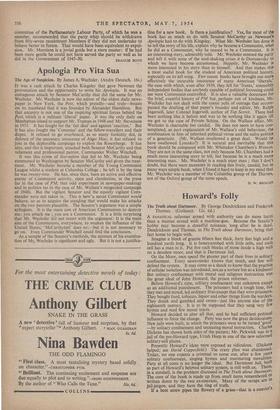Apologia Pro Vita Sua
The Age of Suspicion. By James A. Wechsler. (Andre Deutsch. 16s.) IT was a rash attack by Charles Kingsley that gave Newman the provocation and the opportunity to write his Apologia. It was an outrageous attack by Senator McCarthy that did the same for Mr. Wechsler. Mr. Wechsler is now the editor of the oldest daily news- paper in New York, the Post, which proudly—and truly—boasts on its masthead that it was founded by Alexander Hamilton. But that ancestry is not one of the inspiring spiritual forces behind the Post, which is a militant 'liberal' paper. It was the only daily on Manhattan island to support Mr. Truman in 1948 and Mr. Stevenson in 1952. It has fought for the 'fair deal' and against 'reaction.' But it has also fought the 'Commies' and the fellow-travellers and their dupes. It refused to go overboard, as so many foolishly did, in defence of the necessary innocence of Alger Hiss; it has refused to join in the deplorable campaign to exploit the Rosenbergs. It has also, and this is important, attacked both Senator McCarthy and that vehement and professional patriot, Commander Walter Winchell.
It was this crime of /Le-nation that led to Mr. Wechsler being summoned to Washington by Senator McCarthy and given the treat- ment. Mr. Wechsler became a member of the Young Communist League whilst a student at Columbia College ; he left it by the time he was twenty-two. He has, since then, been an active and effective enemy of Communist activity, open and clandestine, in the press (as in the case of PM, that odd experiment in newspaper-making) and in politics (as in the case of Mr. Wallace's misguided campaign of 1948). But the vigilant Senator and the equally vigilant Com- mander were not taken in. This is how a secret Communist would behave, so as to acquire the standing that would make his attacks on the two patriots plausible. The Senator's argument was a simple syllogism. It is the main aim of American Communism to destroy me; you attack me ; you are a Communist. It is a little surprising that Mr. Wechsler did not retort with the argument: It is the main aim of the Communists, everywhere, to weaken the influence of the United States; McCarthyism' does so;—but it is not necessary to go on. Even Commander Winchell could find the conclusion.
As a sample of the Senator's methods, the account of his examina- tion of Mr. Wechsler is significant and ugly. But it is not a justifica- tlon for a new book. Is there a justification? Yes, for most of the book has as much to do with Senator McCarthy as Newman's Apologia had to do with Kingsley. What Mr. Wechsler has done is to tell the story of his life, explain why he became a Communist, what he did as a Communist, why he ceased to be a Communist. It is an interesting story, admirably told. Mr. Wechsler entered the party and left it with none of the soul-shaking crises a la Dostoievsky to which we have become accustomed. Happily, Mr. Wechsler is more interested in his story than in himself. And that makes this a most useful book for the student of American political history, especially on its left wing. Few recent books have brought out more effectively the incurable innocence of many American 'liberals,' the ease with which, even after 1939, they fell for 'fronts,' ostensibly independent bodies that anybody capable of political focussing could see were Communist-controlled. It is also a valuable document for the brief, eventful history of PM but, perhaps out of kindness, Mr. Wechsler has not dealt with the comic yells of outrage that accom- panied the drafting of that paper's founder and editor, Mr. Ralph Ingersoll, later Colonel Ingersoll, author of Top Secret. There had been nothing like it before and was to be nothing like it again till we got to the case of Private Schine. On the Wallace affair, Mr. Wechsler is charitable but candid. He does not seem to have con- templated, as part explanation of Mr. Wallace's odd behaviour, the combination in him of inherited political virtue and the naive politics of a geneticist. (Mr. Wallace swallowed a great deal. Would he have swallowed Lysenko?) It is natural and inevitable that this book should be compared with Mr. Whittaker Chambers's Witness. They are not in the same class, not only because Mr. Chambers had a much more interesting story to tell, but because he is a much more interesting man. Mr. Wechsler is a much nicer man ; that I don't doubt, but there were moments in reading this lively, candid, but in many ways simple book, when I found it hard to keep in my mind that Mr. Wechsler was a member of the Coluinbia group of the Thirties, not of the Oxford group of the same epoch.
D. W. BROGAN










































 Previous page
Previous page